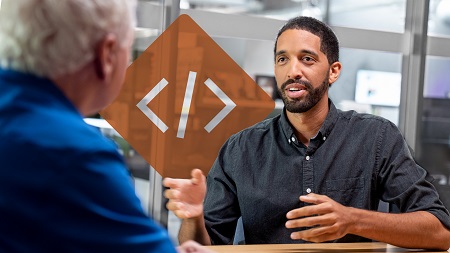
English | MP4 | AVC 1280×720 | AAC 48KHz 2ch | 1h 17m | 596 MB
Hiring a new developer is a huge investment for any team. But determining whether a candidate has both the right attitude and technical background requires an interviewer with programming skills of their own. This is where you come in. In this course, Billy Hollis shows developers and development managers how to prepare for and conduct interviews to accurately assess a candidate’s technical aptitude and overall fit. Discover what to do before the interview to ensure you’re prepared and warmed up; which questions to ask to assess a potential hire’s enthusiasm for their work, as well as the depth of their technical skills; and how to listen and keep the interview on track.
Topics include:
- Preparing a list of questions
- Analyzing the resume and cover letter
- Decoding overly wordy resumes
- Assessing a candidate’s technical skills
- Offering advice to an unsuccessful candidate
- Setting expectations for next steps
- Enhancing your listening skills
- Interviewing as a team
Table of Contents
Introduction
1 Technical interviews
2 Prepared interviewing yields better results
3 Techniques, questions to ask, and follow-up
Preparing to Interview a Developer
4 Technical skills and soft skills
5 Have a list of questions ready to use
6 Request sample code
7 Analyze the resume and cover letter
8 Alphabet soup and why they cook it
9 Neutral vocal tone and body language
10 Warm up for a good candidate
Getting to Know a Candidate
11 My list of questions
12 Think back to a system from five years ago
13 The alphabet soup on a resume
14 The weirdest bug you’ve ever encountered
15 Drill down on object orientation
16 Hypothetical app needs
17 Dinner with an industry luminary
Assessing a Candidate’s Knowledge
18 Deeper questions
19 What’s your philosophy of user interface design
20 Comparing platforms
21 Pros and cons of agile methodologies
22 How do you become familiar with new technologies
23 Questions about n-tier architectures
24 No-win situations
25 Team work and individual work
26 User experience
Beyond the Interview Questions
27 Let the candidate ask questions
28 When a candidate isn’t a good fit
29 Offer advice to an unsuccessful candidate
30 Set expectations for what happens next
31 Write down impressions immediately
32 Reference checking
Tips for Interviewing
33 First impressions
34 Listen more than you talk
35 Work on your listening skills
36 Additional listening tips
37 Steer the interview
38 Avoid too much socializing
39 Business focus or technology focus
40 Taking notes
41 Interviewing as a team
Conclusion
42 Next steps
Resolve the captcha to access the links!